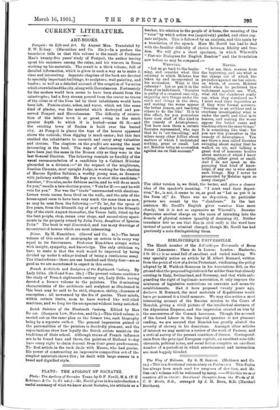C URRENT LITE RAT EIRE.
ART-BOOKS.
Pompeii : its Life and Art. By August Man. Translated by F. W. Kelsey. (Macmillan and Co. 25s.)—In a preface the translator tells us that this volume is the result of Professor Man's twenty-five years' study of Pompeii, the author having spent his summers among the ruins, and his winters in Rome working up his materials. The result is a thick volume, full of detailed information, which is given in such a way as to make it clear and interesting. Separate chapters of the book are devoted to specially important buildings, to sculpture, wall-painting, and trades ; as well as a detailed account of the eruption of Vesuvius which overwhelmed the city, along with Herculaneum_ Fortunately for the modern world lava seems to have been absent from the catastrophe ; had a fiery stream poured from the crater no traces of the cities or of the lives led by their inhabitants would have been left. Pumice-stone, ashes, and water, which set like some kind of plaster, was the material which destroyed and pre- served Pompeii and Herculaneum. The difficulty of excava- tion of the latter town is so great owing to the much greater depth to which it is buried—some 65 ft.—and the existing town of Resins, is built over the buried city. At Pompeii in places the tops of the houses appeared above the rubbish ; thus digging is much easier; but this fact enabled the inhabitants to unearth and carry away valuables and statues. The chapters on the graffiti are among the most interesting in the book. The ways of electioneering seem to have been just the same in the Roman city as they were in the last General Election. The following reminds us forcibly of the usual recommendation of a candidate by a Cabinet Minister placarded in a division :—" At the request of the neighbours, Suedius Clemens, most upright Judge, is working for the election of Marcus Epidius Sabinus, a worthy young man, as dunmvir with judiciary authority. He begs you to elect this candidate." Another, " Proculus, make Sabinus aedile, and be will do as much for you," recalls a late election poster, '6 Vote for H— and he will vote for you." Nor was the " trade" unconnected with elections. Lovers wrote verses from Ovid on the walls, and the arts of the house-agent seem to have been very much the same then as now, as may be seen from the following :—"To let, for the space of five years, from the fifteenth day of next August to the fifteenth day of the sixth August thereafter, the Venus bath, fitted up for the best people, shop, rooms over shops, and second-story apart- ments in the property owned by Julia Felix, daughter of Spurins Felix." The book is wq11 illustrated, and has may drawings of reconstructed houses which are most interesting.






































 Previous page
Previous page